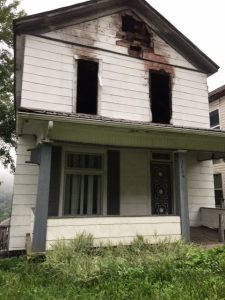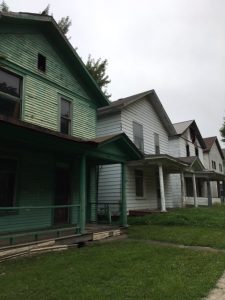While Summers County has a myriad of health issues on which we could focus our work, the Community Health Improvement (CHI) Committee chose to focus on a lack of safe and affordable housing for low-income residents. The lack of safe and affordable housing in the county and the city of Hinton, as well as the abandoned and dilapidated structures, have detrimental effects on property values, public safety and health, fire safety, and economic development.
Tell us about the housing in Hinton.
There is a lot of dilapidated housing in Hinton, so over the last three years, the city has torn down some housing. The city just received $170,000 more from DEP through the auditor’s office, and they’re going to tear down quite a few more houses. However, we feel pretty good about the progress being made on dilapidated housing.
There are different levels. One issue is that there are houses that are structurally sound that do not need to be demolished but are not being taken care of. This means that in 3-5 years they will need to be demolished because they will not be structurally sound anymore. So, it’s not just a question of taking care of houses that would be considered unable to be renovated, it’s also taking care of houses that could be rehabbed and made available for people to live in.

What is your goal this year?
Our goal over the next three years is to improve access to safe, affordable, and well-managed rental housing.
Where we are, you know – as far as 2023 – our focus could be working on cataloging which rental properties are available for long-term rental, and categorizing the condition of the structure.
There is another goal, and that is talking to renters about what their rights are in terms of the property that they’re in now. So we’ve got that brochure that is going to be distributed. Hopefully, that will be ready sometime here within the next few weeks to get out to the public.
Why is this something that you wanted to do?
I think one of the reasons that we chose to work on housing is that dilapidated housing, abandoned buildings, and vacant properties which have been vacant for a while are clearly a public safety and public health issue. Also, this drives down property values. We’re hoping that because it has an impact on everybody in the community, that it will also be an opportunity to get everyone involved.
How do you plan on achieving these goals?
Through The Center for Rural Health Development, WWHSC facilitated the city of Hinton to provide a $20k match, so they now have $40k to begin to establish a Land Bank, which they call it a Land Reuse Committee. They’ve identified a house, which was donated to the city. It is a brick structure and they’re going to rehab it, then sell it to a working family. The money from that sale is then re-invested into the Land Bank fund to help rehab other houses.
And we’re still working with the County Commission on their Dilapidated Structures Committee as well. So, Hinton is probably further along than we are in the rest of the county, but the county is working on it and partnering with them as well.
Do you need volunteers?
Well, maybe not on this one particular house. But when we’re talking about some other not-for-profit NGO groups to maybe work with folks who need help repairing their homes, then yes. Some of these homeowners must meet income guidelines.
Between the local groups, Bethlehem Farm, the Appalachian South FolkLife Center, and then this group we identified from Catholic Charities, there will be plenty of volunteer opportunities.
We also haven’t given up on CAP – the Community Action Program. They do the weatherization and needed repairs for low-income homeowners and cover a 9 to 11-county area.
So besides this fund with the city of Hinton, there are other rehab groups we’re working with to try to help people fix up their place.
One area that we could use volunteers would be to serve on our CHI Committee. It doesn’t involve physical labor, but providing input and talking to people about what we’re trying to accomplish would be a big help.

What kind of volunteers would be helpful?
I think the Appalachian FolkLife Center which is here in (Pipestem), they have a contractor that works for them. I think he would love working with local residents. They won’t do anything like roofing, electrical, plumbing or anything like that, but they will do some structural repairs to porches or overhangs, as well as gutters and painting.
Part of their goal is to make connections within the community. So working with local volunteers and not just the church groups that they get from outside the state, I think would be an opportunity that they would very much appreciate.
Do the volunteers need to have specific skills?
No, not necessarily. They actually learn the skills as they work on the house under supervision. Some of them have already developed the skills because they’ve already been with the Appalachian FolkLife Center in past years, and enjoyed the experience so much that they signed up again. Therefore, those volunteers’ skillsets are a little bit higher than those who are inexperienced.
Mainly, if we’re talking about recruiting young people, there has to be a desire to work. The volunteers we had for the playground, the majority of them did expend the effort to paint and varnish and spread mulch. You know, it’s just about having the right attitude, wanting to give back, and learning skills for them to broaden their horizons about other types of people who they might not normally meet.
How does this impact/benefit the community?
To reiterate what Shalom said earlier about this being a public health issue; having substandard housing is a public health problem. What motivated us three years ago or so, was the house fire that killed a couple of children.
It seems like it is daily you see or hear stories of sad situations some of these families have to live in. For example, this house the city received to rehab, definitely had homeless families living in there. I went in, and there were toys inside. There’s another house that’s owned by a realtor who owns multiple properties in town, and somebody’s living in it with children. Shalom’s been in that house, she said there are big holes in the floor and what not. There are definitely kids living in substandard housing.
Hopefully, one of the results of the work that we’re doing will be to make sure that housing codes are enforced, at least to the level of the state, if not even more. Some of the living conditions that people are living in are horrific.
I know a young woman who – with her husband and children – had raw sewage in the basement, and they could not get the house manager/absentee landlord to do anything about it.
Finally, the public health department was called to condemn the property. That kind of situation should not be happening. I think we need to look at not just enforcing the housing codes, but helping people to realize that they do not have to live in those conditions. That there are options for them, and that they do have a voice and power.
How did you get funding for this project or do you still need funding?
We hope that it’s going to be self-sustaining, that when we take the $40,000 which includes the city match of the Center’s $20,000, that we’ll be able to use the profit from that and all of it will be profit to flip 1 or 2 more houses, as well as creating a sustainable fund.
The mayor has talked about other potential sources of funding – like working with the Hinton Area Foundation. For instance, if people can see an impact, maybe if a fund could be set up that people could donate to, which would go into rehabbing houses. We’re always looking for funding.
Our plan for Summers County is bold and ambiguous, but we believe we can accomplish our goals with the help of our community members who want to see Summers County thrive. We invite you and your organization to work alongside other community members as we address housing in our community. If you are interested in volunteering or joining our CHI committee, please fill out our form on our landing page here.
